The Paris-Dakar race is notorious in France. Since 1978, off-road vehicles have been battling it out once a year, over a staggering distance of 9,300 km, in an attempt to win the daddy of all endurance rally events. Intense heat, mud, rocks and sand dunes are some of the obstacles faced by cars, quads and motorbikes during the gruelling, several-day race… and only one woman has ever won it. In 2001, there were 350 starters, both male and female, and the German Jutta Kleinschmidt beat them all. I recently had the honour of making her portrait, in Monaco.
Cutting-edge racing at sixty
Jutta Kleinschmidt celebrates her 60th birthday this year. While the Paris-Dakar may be in her rear view mirror, it doesn’t mean Jutta’s done with racing, or breaking new ground, however. Now, her attention is focused on a field where she can perhaps reconcile the physics studies of her youth, with racing. Extreme E is a brand-new, electric, off-road race series at the cutting-edge of green technology. Electric car races are held in places like Saudi Arabia or Greenland, to highlight the impacts of climate change, and at the end of last year’s inaugural series, the team Jutta drives for finished in 6th place. This sport doesn’t lack excitement: the electric SUVs might be identical, but they can do 0-100 km/hr in 4.5 seconds, happily donut across sand dunes, roar around on two wheels, jump and reach top speeds of 200 km/hr. Equality is present in this flagship sport, too: each team consists of a male and a female driver, who share a car and have equal driving time.
No glass ceiling – instead, a plunging drop
I was commissioned by Stern magazine to make Jutta’s portrait for the regular feature, ‘What are they doing today?‘, about people who were once in the headlines. For consistency, the photographer’s brief was specifc: I was to capture Jutta in one of her local haunts, straight-on, seated or leaning and smiling to camera. However, her manager hadn’t wanted to give me Jutta’s phone number, and apparently knew little about her daily routine. The Monte Carlo Casino was chosen as our meeting point (for its central location, I assumed, and not because Jutta is a regular there). Familiar with the permission system for photographers in Monaco – no, the magazine hadn’t arranged the necessary authorisation-, I knew I couldn’t take a portrait in Casino Square, patrolled as it is by police around-the-clock. So I planned to work in the gardens below (which I hoped she’d know), with views along the French Riviera – and fewer policemen. A backdrop of open sea and a big, blue sky seemed quite appropriate for a woman for whom the glass ceiling is clearly irrelevant.
Monaco’s population of 38,000 fits into an area no bigger than 2 km², making the principality appear somewhat upright. Towers, cliffs and plunging drops define the urban landscape, and the Casino gardens are no exception. There, businesspeople on their lunchbreak sit on benches beside giant cacti, soaking up the South of France sun before a wall that is low enough to let them enjoy the sea view – and is also the only thing standing between them and a ten-storey drop to a terrace below. Looking at the wall, I saw its potential for a portrait set-up – and was torn. As a photographer, I don’t normally ask my portrait subjects to do anything that I wouldn’t do myself, and this would definitely not be a position I’d be happy to demonstrate. Yet if there was anyone I thought I could ask to sit on that wall, it was Jutta Kleinschmidt.
Falling foul of the Monaco police
Evidently less bothered about sharing her number than her agent was, Jutta sent me a WhatsApp text with a smiley when she arrived, bang on time. Dressed unfussily, with low maintenance make-up and no wardrobe changes, she needed no persuasion whatsoever to sit on the wall, and she didn’t flinch at sitting on damp grass for another portrait, either. When I forewarned her of potential problems should policepeople pass by, asking for authorisation, she responded that it would be her birthday and I wasn’t a professional photographer, just an old friend taking a picture for her boyfriend. Later, when two officers actually did appear on the horizon behind my back, Jutta didn’t miss a beat, adeptly mouthing an alert and so giving me time to slip my camera into my bag, unnoticed. Afterwards, we compared anecdotes about being on the wrong side of the Monaco police. Unsurprisingly, hers involved more adrenaline. She, for example, had been stopped at 3 am on a motorbike in a situation combining speed, a tunnel and a number of passengers (apart from her car racing prowess, Jutta has also been officially named a ‘Legend’ by the global governing body of motorcycle racing); I’d once been given a formal warning for sleeping under a royal tree.
Macho idiots and decent blokes
Our conversation flowed easily and it transpired we had more in common than I’d imagined a photographer might have with a racing driver. We discussed travelling, and how that is made easier by a child-free, pet-free and plant-free (cacti excepted) existence. We share an interest in exploring the South of France (suprisingly rarely expressed by Monaco residents, in my experience), talked about running, biking and hiking, and compared notes on what it’s like to work in a traditionally male-dominated industry (“in any business, there are both macho idiots to ignore and decent blokes to appreciate” – the navigator with whom she won the Paris-Dakar definitely being in the latter category). Jutta’s combination of down-to-earthness and bravery, along with her extraordinary achievements, certainly inspired me, and make her a worthy role model for women everywhere.
> See Portrait portfolio
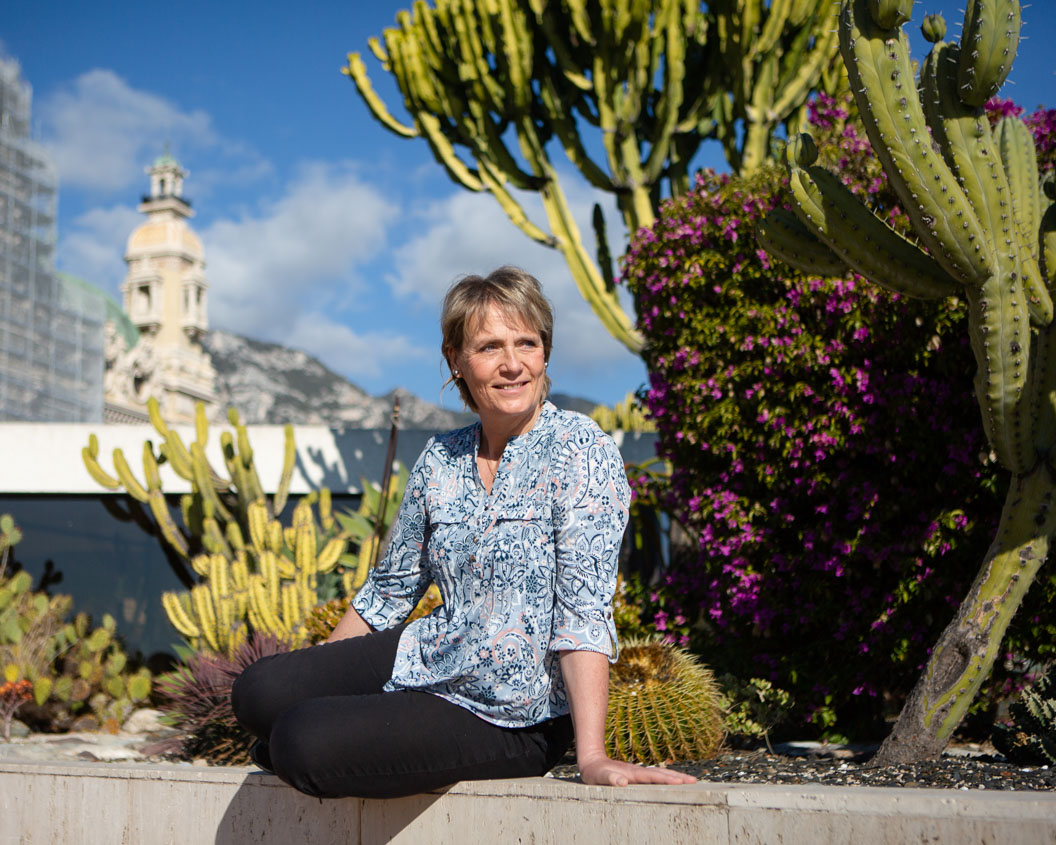
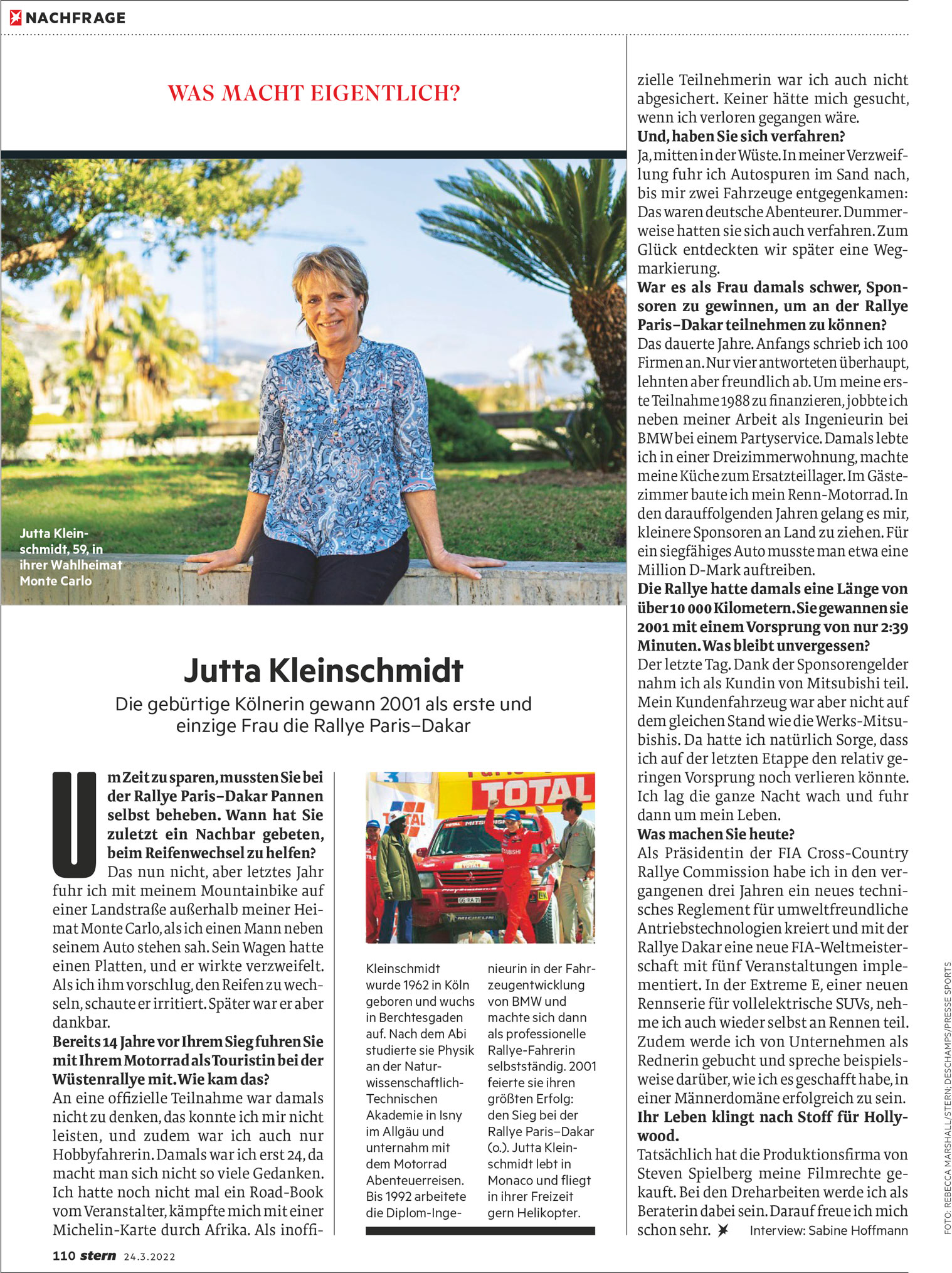
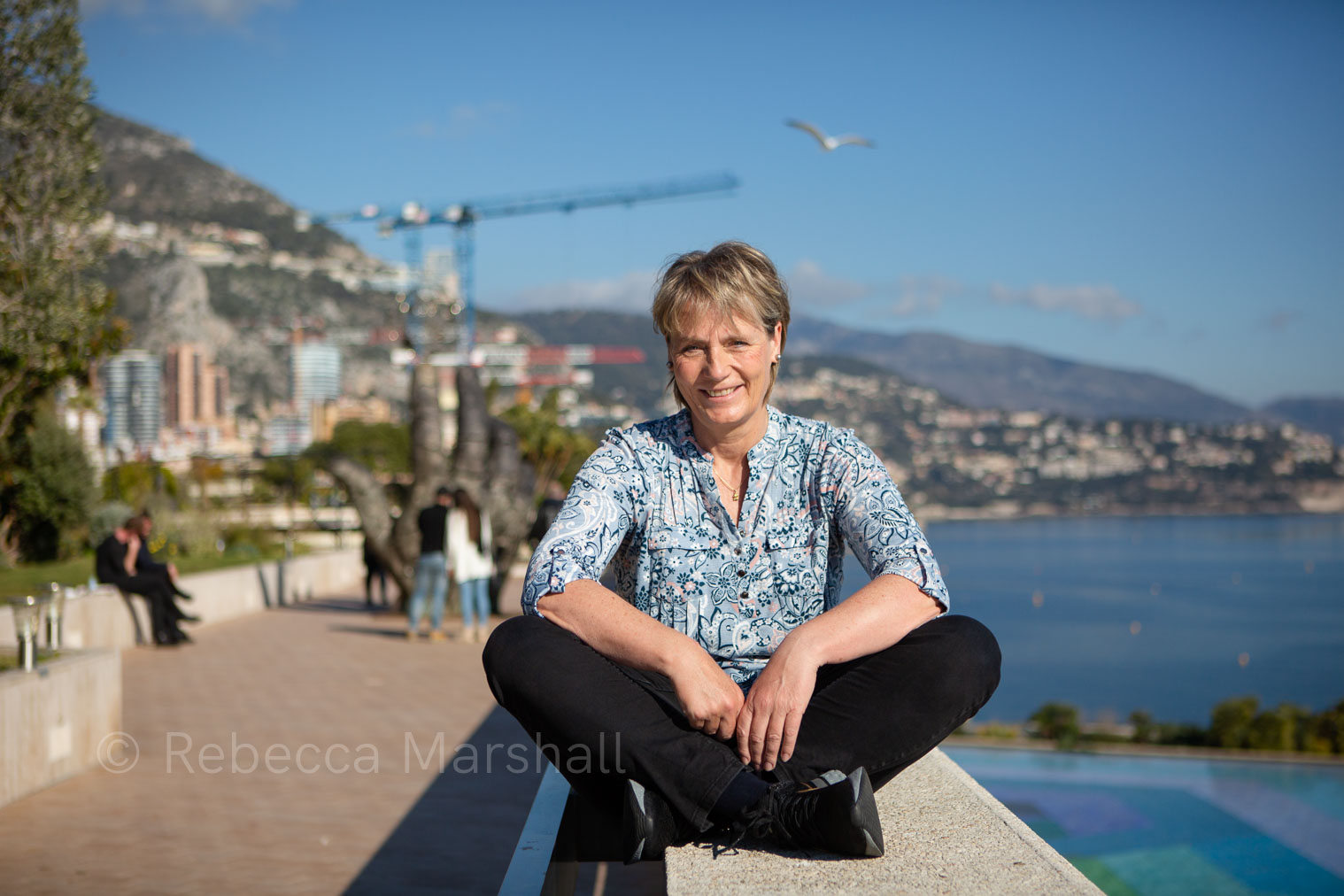
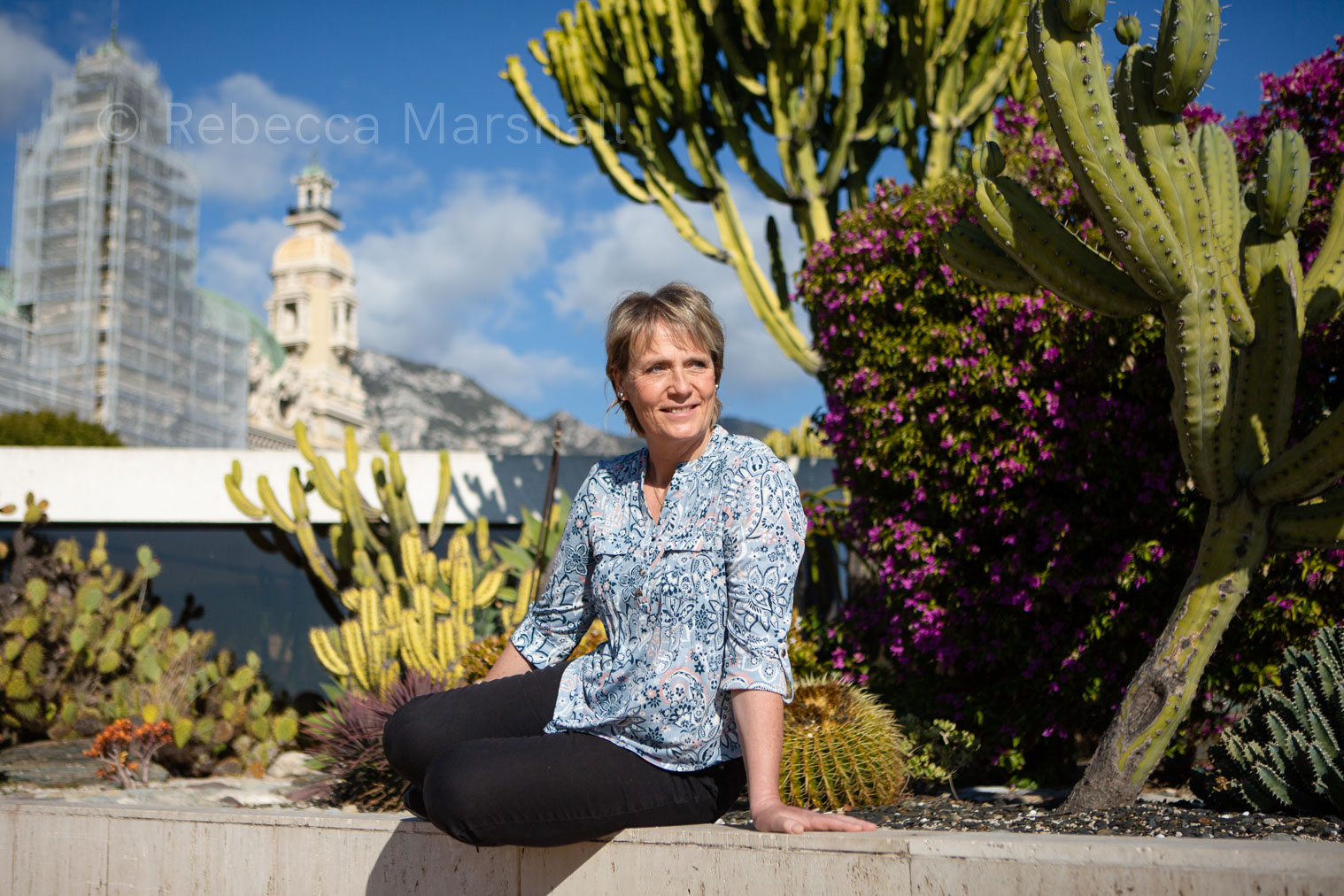
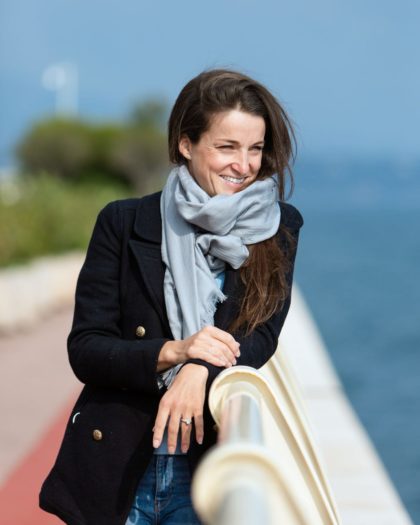
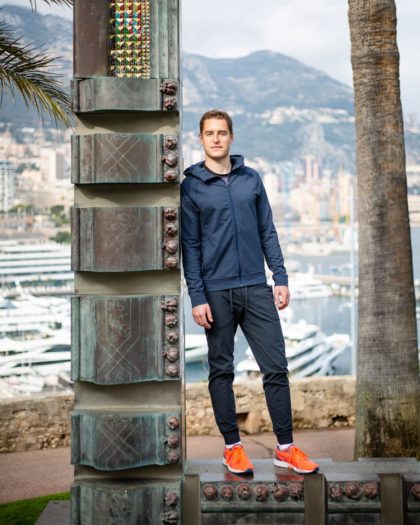
Mandy Dowd
Apr 6, 2022 at 11:07 am
I love this post!
Rebecca Marshall
Apr 6, 2022 at 11:59 am
Thank you 🙂